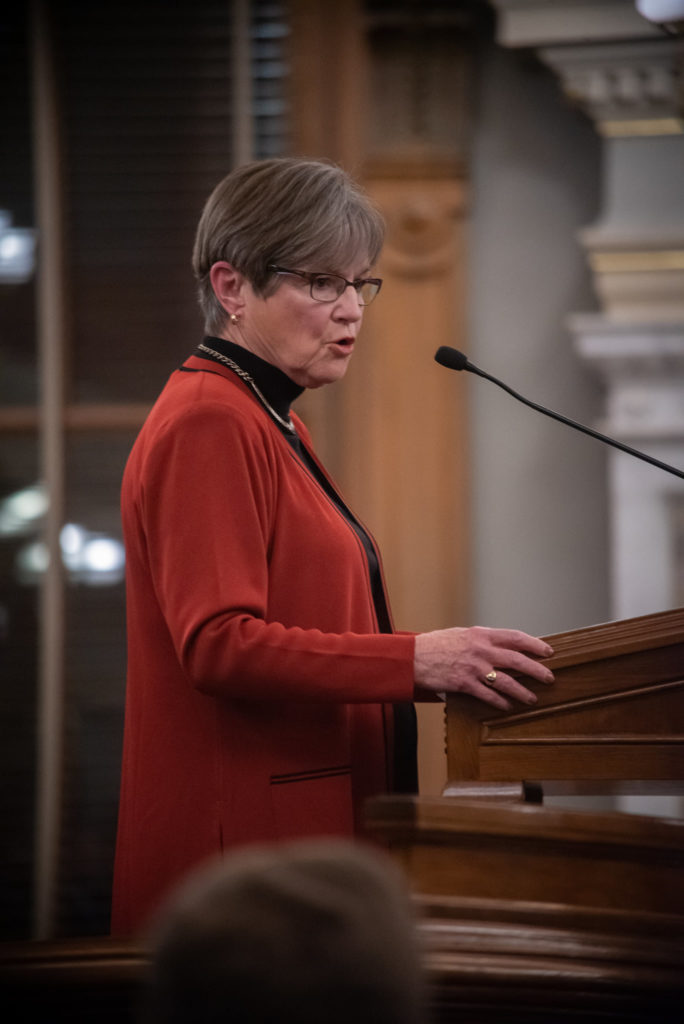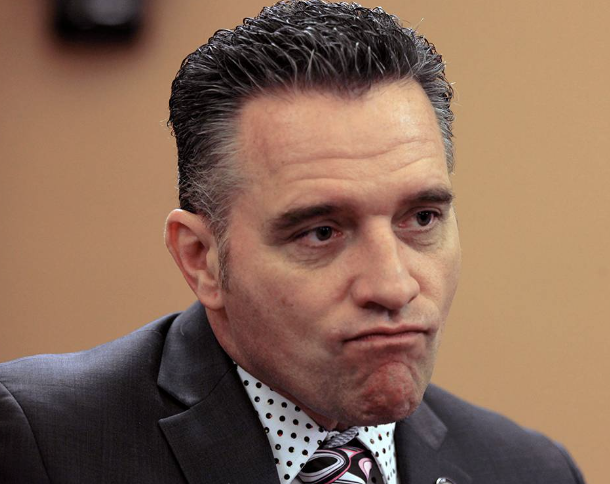State of the State Address
Gov. Laura Kelly delivered her annual State of the State address on Tuesday, Jan. 24, after it was postponed from the first week of the session due to a false positive COVID test. Her speech centered on working across the aisle to make Kansas the best place in America to live, work, and raise a family. She outlined her priorities, which were also highlighted in the presentation of her budget during the first week of the session. Those priorities include the following:

- K-12 Education: Funding K-12 education for the fifth year in a row and putting Kansas on a path to fully fund special education.
- Workforce Development: Creating apprenticeships to strengthen the state’s workforce.
- Water: Funding the State Water Plan for the second year in a row to help address the biggest issue facing western Kansas – a water supply that is running out.
- Mental Health: Calling for expanding programming in schools and addressing the mental health crisis in Kansas by addressing the mental health worker shortage in our state.
- Opioid Crisis: Calling for the decriminalizing of fentanyl test strips to prevent Kansans from exposure to fentanyl and providing funding for schools to have naloxone on hand to temporarily reverse student overdoses.
- Early Childhood: Establishing a task force to explore creating a cabinet-level agency dedicated solely to early childhood care, development, and education.
Work has been slow the past two weeks leading up to the State of the State address. Now that her address is over, the pace has already picked up. We know the firehose is coming.
The full transcript of the Governor’s speech can be found here.
Senate President Responds to State of the State Address
Immediately following Gov. Kelly’s State of the State address, Ty Masterson (R-Andover) delivered a pre-recorded response that provides a stark contrast in leadership and a vision for Kansas. First, rather than talking about working together for the sake of Kansas’ success as Governor Kelly has done, he makes sure to point out that Republican efforts to downplay Governor Kelly’s successes resulted in a narrow re-election victory. Further, Masterson made clear that supermajorities continue in the House and Senate. Masterson then went on to parrot national talking points pushed by the extremists in his political party. Bowing to the marching orders of extremists carries the sole purpose of perpetuating division. Concerning is that the extreme points of view promoted by Masterson continue the firehose of mis- and disinformation to paint a distorted picture of the truth in Kansas.

Public education and particularly the professionals who work in our schools are the villains du jour in the eyes of the extreme wing of the Republican party. This carries true even though many Republicans are divorcing themselves from that extremism. While Gov. Kelly calls for continued funding provided to schools to give all Kansas students an opportunity to succeed, Masterson has renewed the annual call for voucher schemes. Those who push voucher schemes want desperately to reframe them as something more palatable. But vouchers are like swampland; hard to sell because it doesn’t take a long look to realize only the seller is benefiting from the deal. And, calling swampland “property with views of nature and the water” doesn’t change the fact that it is swampland. Masterson did not call for full special education funding. Additionally, Masterson did not call for increased funding to meet inflation requirements. Instead, he levied more attacks on public schools, educators and students all based on his party’s purposely distorted perceptions of what educators and students truly face in our public schools.
Gov. Kelly shared a vision to prepare Kansans for a 21st-century workforce. Masterson calls for “classical education” – which in the past has meant teaching almost exclusively the traditional “3Rs” while minimizing everything else. Then, like a smiling puppet whose strings are held by extremists in the national party, Masterson made completely false and baseless accusations that the teachers’ unions have radicalized our public schools. Forget that no evidence is offered except that unions often oppose onerous legislation designed to weaken public schools in order to paint them as failing.
Finally, Masterson notes that, once again, a top priority is singling out transgender student-athletes and making them political pawns in the ongoing culture war led by his political party – an effort that has been defeated now two years in a row. Apparently, it is difficult for Masterson and his party to believe that there ARE NOT dozens of high school males willing to live attend school and compete as high school females in order to steal a track and field scholarship. That KSHSAA already has policies addressing these issues makes no difference because the attack isn’t about students, it is about partisanship. Attacking students who are at risk of mental health issues- students who already feel marginalized- on an issue where policies and rules currently exist, is evidence again that Masterson is the captain of a ship with a moral compass that needs repairing.
Kansas AFL-CIO Lobby Day
More than 100 people from brother and sister unions across Kansas gathered at the Statehouse on Thursday, Jan. 26, to discuss issues important to working Kansas families.
Some issues highlighted were workers compensation reform, moving forward with the elimination of the sales tax on food, reform of so-called “payday” loans, and a sales tax holiday on school supplies.
The gathering started with a conversation with a bi-partisan group of legislators from both the House and Senate. Present for this discussion were House Democratic Leader Vic Miller, D-Topeka, State Representative Fred Patton, R-Topeka, Senate Democratic Leader Dinah Sykes, D-Lenexa, and Senate President Ty Masterson, R-Andover.
We’re pleased to see the bi-partisan approach to the day. That is the way it should be.
Unfortunately, typical “union” issues and concerns have faced strong headwinds in Topeka for years. This opposition isn’t necessarily due to a rabid anti-worker mentality amongst legislators; rather it is due to a well-funded coalition of “pro-business” players who fundamentally believe it is their duty to oppose government spending and oppose legislation that has the intent of protecting workers from abuse from powerful corporations.
These lobbyists have conditioned large groups of legislators to believe state government revenues are better used for tax breaks for large companies than on a high-class public education system. A result of this dynamic has been some very heated debate, a lot of hard feelings, and distrust amongst people who really shouldn’t have a problem working together.
No one made a better case for the necessity of working together than Masterson in his remarks to the group: “I’m more like you than you know,” he said. “I used to drive a truck, I followed behind a garbage truck, engage us in the conversation. You have a voice, use it. My door is open.”
Engage him we will.
You read earlier we took issue with some of Masterson’s remarks in his response to Gov. Kelly’s State of the State address; particularly with the statement that our opposition to the so-called Parents’ Bill of Rights is a “path is resulting in our schools devolving into little more than factories for a radical social agenda.” All public schools in Kansas have policies, rules, and procedures for addressing parent concerns and ensuring their rights to be heard via the locally elected board of education.
We’ve seen similar statements all over the country. This is a version of a national talking point designed to divide. Let’s face it: reckless rhetoric is not unique to Masterson’s political party.
Here’s the good news: When Masterson says his door is open, he means it. As a matter of fact, before he finished speaking on Thursday, his staff had already added KNEA to his calendar.
Kansas NEA Government Relations has a relationship with Masterson. Actually, KNEA Government Relations can report this relationship has always been cordial and one of mutual respect even when disagreements occur. Business item #1 is to expand that relationship into a productive one where we can work together.
We do this by letting him get to know who our members really are. As much as he may try to cast educators as the villains in a national campaign of misinformation procured by his party, our members are simply dedicated educators who work every day to help students succeed. To use Masterson’s own language, we may be more like him, than he knows.
We look forward to meeting with President Masterson.
Governor’s Council on Education
Members of the Governor’s Council on Education met on Friday, Jan. 27, for the purpose of presenting Gov. Kelly with their annual report.
See the Council’s report here.
The report, which is 35 pages long, lists the following recommendations in the executive summary:
- Improve the Alignment of Early Childhood Care and Education Systems Across State Agencies
- Increase Opportunities for High School Students to Earn Certifications and Credentials that Crosscut All Industries
- Leverage Existing Resources and Structures to Facilitate More Effective PostSecondary Transitions for Kansas Students
- Charge the Technical Education Authority to Enhance Their Coordination of Technical Education Pathways Between K-12 and Post-Secondary Education
“I established the Council on Education not only because I believe that educating our children is one of the most important obligations of our elected leaders, but also because it’s one of the best economic investments we can make as a state,” said Gov. Kelly. “I’m proud of the work the Council has done these last four years searching for innovative ways to provide for our students, and I look forward to addressing their recommendations to ensure Kansas students have access to the best education in the country.”
The council was originally created by executive order in 2019 and was designed to “bring together education and business leaders to realize a shared vision of increased prosperity and look for ways to enhance early childhood education and develop partnerships to address workforce needs in Kansas.”
The bi-partisan membership of the council has spent months traveling throughout Kansas talking and listening to both educators and business leaders about the importance of education in their communities as well as the challenges and areas of improvement.
Kansas NEA is well represented on the council by President Sherri Schwanz, Dr. Nicole Foster an ELA educator in USD 250 in Pittsburg, Kansas, Maria Worthington an ELA educator in Blue Valley USD 229 in Overland Park, Kansas, and Director of Government Relations and Elections Lauren Tice Miller.


